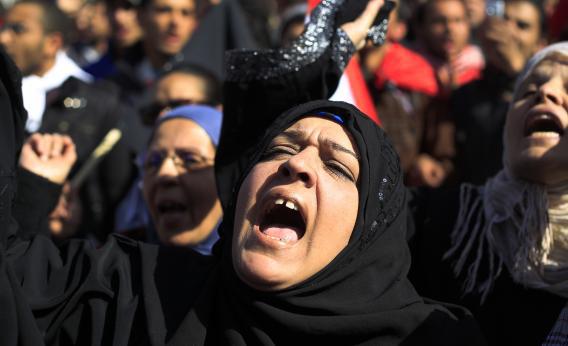It is winter again in Cairo. Amid continued civil disobedience, backsliding by the military “transitional” government and souring attitudes, people rightly took time this week to celebrate the rising that ejected Hosni Mubarak’s despotic regime a year ago.
But the country is in crisis. While political activists and military men debate the direction of the revolution, Egyptian bankers finally acted on the threat to Egypt’s future: its collapsing economy.
Last week, Egypt asked the IMF for a $3.2 billion loan to prevent the country from running out of hard currency – a reasonable definition for bankruptcy in a country that imports a good deal of its food. Some believe it could take months, given the uncertain state of the country’s government, for the IMF to agree to such a loan. A devaluation looms for the Egyptian pound, propped up by the central bank with the country’s dwindling dollar reserves. If not handled properly, a technical default, followed by massive government layoffs, food riots or worse, could follow.
I’ve always regarded the worst-case scenarios for Egypt – renouncing Camp David, the rise of a puritanical Islamic regime – as bordering on delusional. Those who have spent time in Egypt know that extremism exists there, as in most places, but also that Egypt is too complex a society, with its deep and conflicting strains of liberalism, militarism, socialism, Coptic Christianity, Wahabbism – to name just a few - to embrace blanket intolerance. (Note to outside analysts: Pointing out that Ayman al-Zawahiri is Egyptian is no more profound that noting that Stalin came from Georgia or that Tim McVeigh once served in the US Army. They had to come from somewhere).
That said, with Egypt’s first presidential election expected in the summer, an economic crisis right now courts disaster. No act of God or man could do more to make the paranoid worst-case scenarios a reality than a collapse of Egypt’s economy during the country’s first democratic campaign election. If you think the Great Recession has cheapened the American political dialogue, just watch what ugly populism does to Egypt.
Egyptians already suffer from dashed expectations following Mubarak’s ouster – primarily because the military leadership stupidly spurned an IMF loan offer last year, as well as loans proffered by a host of Gulf emirates. After years of very reputable macroeconomic policymaking at Egypt’s central bank, the past year, under the thumb of Field Marshal Husain Tantawi, has been a disaster. Sadly, the “self-reliance” fallacy runs deep in Arab militaries, particularly among officers reared in Nasser’s day.
But herein lay an opportunity for Washington. Cairo, as the State Department made clear yesterday, has picked an unwise fight with the US over the activities of congressionally funded pro-democracy groups, the National Republican Institute and the National Democratic Institute. That led President Obama to publicly threaten – for the first time – to make the $1.3 billion in military aid the US hands to Egypt each year contingent on the country’s progress toward democracy.
This $1.3 billion in military aid has been handed over to Cairo yearly since 1979 as a kind of ransom payment to secure the Camp David peace with Israel. (Israel, of course, receives even larger military aid packages annually as part of the deal – some $2.7 billion in 2011).
This year, as usual, the US foreign aid budget includes that $1.3 billion for Cairo, along with another $250 million in economic aid for the country. While some fear any conditionality placed on the military aid payment could imperil Camp David, a far wiser way to handle the issue would be to convert the aid entirely to economic assistance.
The army, of course, would be livid – and might struggle to pay its salaries. But reforming Egypt’s army – indeed, taking it down a peg or two – is a prerequisite for making progress toward an Egyptian democracy. Like many armies in countries run by dictators, Egypt’s was bought off over the years with the transfer of huge swaths of the national economy to military control. They may, indeed, constitute a reasonably good fighting force (we don’t really know – they last time they went to war was in the 1991 Gulf War, when Egypt sent a brigade of US-supplied tanks to help eject Saddam from Kuwait). What we do know is that they have done a miserable job running the Egyptian economy.
Egypt may not secure the $3.2 billion it needs from the IMF in time to forestall an economic crisis, or the $500 million its seeking from the World Bank. But Washington can ensure that a bridging loan – say, $1.3 billion – is made available to the Egyptian central bank almost immediately. If Egypt truly is taking control of its own destiny, then expecting the United States to pay a $1.3 billion ransom to its generals every year to do something that is in their national interest anyway – namely, NOT attack Israel – makes less sense than ever. The US should put that money where it will do some good – or at least, where it will prevent something bad.
